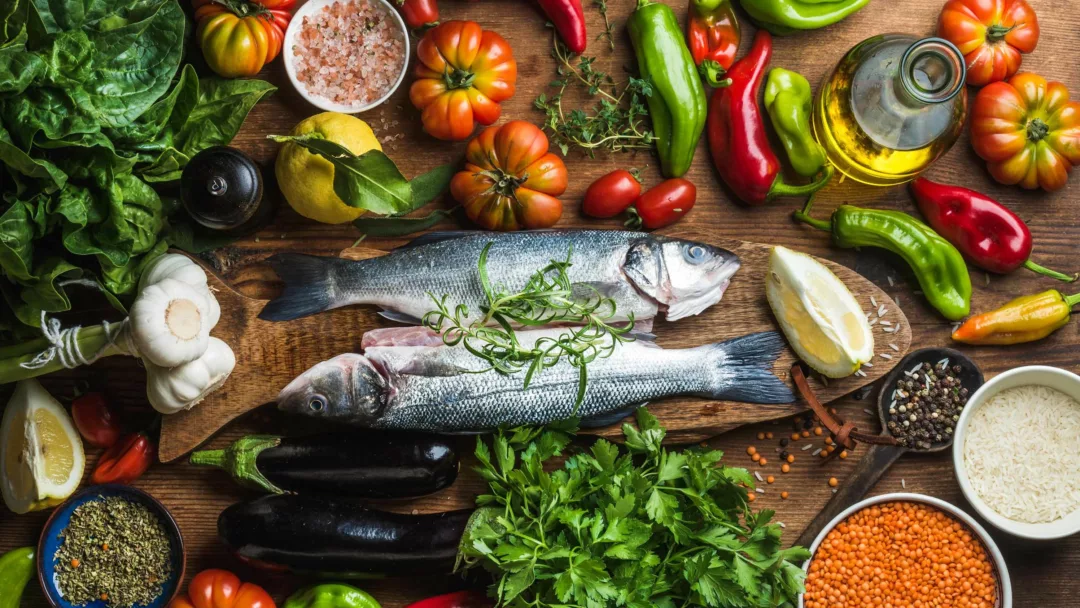The Mediterranean Diet
By: Dana Engram | Medically Reviewed by Dr. Tanuj Palvia, MD
The human body is a phenomenal, multifaceted, and powerful machine that is capable of performing a wide variety of functions. It is made up of many different systems and structures, each of which plays a crucial role in maintaining the overall health and well-being of the body. Eating a healthy and balanced diet is important for optimal functioning of the body and, if provided with the proper nutrients, the body can accomplish amazing feats that test the limits of human capabilities. In order to truly support our body’s well-being, it is essential to prioritize a healthy diet and lifestyle.
Many Americans overlook perhaps one of the most fundamental keys to survival; our diet and nutrition. Unhealthy food consumption among Americans contributes to the United States having the highest per capita cases of depression, obesity, and hypertension in the world. Obesity, in particular, has been found to be the most common link to chronic skeletal and muscular pain and continues to rise drastically with approximately one-third of the nation being categorized as obese (Fegal et al., 2010).
The most common musculoskeletal
conditions are Fibromyalgia,
Rheumatoid Arthritis (RA),
Ankylosing Spondylitis, and Gout
which causes inflammation of
cartilage or joints, causing pain
and stiffness that can worsen with
age (Mayo Clinic) (Bykerk, 2022).
Affected joints may feel warm,
swollen, and tender and limit range of motion. Generally as we age, we begin to decrease physical activity
and our capacity to keep the same level of physical activity as we had during our teenage and young adult years declines. Musculoskeletal pain is often the result of a lack of physical activity, including activities of daily living. But if you are active and manage your diet and weight for the most part, you may be wondering why you still experience chronic pain.
Poor diets that are heavily reliant on meat, or high in calories, sugar, and salt, have been linked to the development and worsening of various chronic inflammatory conditions. Additionally, diets deficient in vitamins A, B12, D, E, K, calcium, magnesium, and folic acid can lead to higher risk factors for lumbar (lower back) pain and Sciatica in men and women (Elma et al., 2020).
Protein is an essential nutrient for maintaining and building muscle mass. When you consume protein, your body breaks it down into amino acids, which are then used to repair and rebuild muscle tissue. Regeneration of muscle is an ongoing process and can be influenced by various factors, including exercise and nutrition. Humans are omnivorous, which means we can acquire protein and minerals from both animal and plant food sources. It is interesting that some protein sources may provide greater
protective effects in the body compared to others. Emerging research suggests that the specific type of protein consumed may have a positive impact on the musculoskeletal system, and it appears that plant-based protein sources may be healthier for the body than animal meat-based protein sources.
Plant-based diets, which include lots of fruits, vegetables, and whole grains, can induce pain relieving effects for people suffering from chronic musculoskeletal pain. Incorporating plants and nuts into your diet can lower inflammation and help reduce chronic pain and disability in skeletal muscle. These anti-inflammatory benefits from plants and grains have been found to be effective specifically for managing rheumatoid arthritis and diabetic neuropathy.
Mediterranean Dish
The mediterranean diet is a
plant-based diet abundant in
wholegrains, legumes, 5 or more
fruit and vegetables per day
(Philippou & Nikiphorou, 2018). It
is characterized by unrefined cereals,
extra-virgin olive oil (EVOO), a
moderate consumption of poultry,
dairy products and eggs and a low
consumption of sweets and red meat (Petersson et al., 2018). The diet described below can help maximize your intake of essential vitamins and has several health benefits, such as protecting against oxidative stress, boosting the immune system, preventing cell growth, and preventing cell death.
-
Omega-3 (ω-3) Fish Oils
Omega-3 fatty acids are polyunsaturated fatty acids that reduce inflammation by playing a role in the suppression of cartilage and bone erosion. This fatty-acid is a building block your body uses to create hormones that regulate a wide range of functions, including controlling inflammation and muscle contraction and relaxation (Health & Nutrition). The body does not produce omega-3 oils endogenously, so these oils must be obtained through our diet. Fish meat is a goldmine for omega-3 fatty acids and can significantly lower swollen and tender joints in individuals with RA.
Mackerel is packed with nutrients, providing 500% of the daily recommended amount of vitamin B12 and 130% of selenium in just 3.5 ounces.” A 3.5-ounce serving of mackerel contains 4,580 milligrams of EPA and DHA combined, which are types of omega-3 fatty acids (Healthline).
Salmon contains high quality protein and a variety of nutrients, including large amounts of vitamin D, selenium, and B vitamins. Those who ingest salmon on a regular basis have a decreased risk of conditions like heart disease, dementia, and depression (Healthline).
-
Legumes
Legumes have been linked to various other health benefits, including a reduced risk of heart disease and lower cholesterol levels (Healthline). Chickpeas, lentils, lupins, wisteria, mesquite, carob, tamarind, alfalfa, and clover are packed with folate, potassium, iron, and magnesium and while being plentiful sources for high protein and dietary fiber.
For example, one cup (198 grams) of cooked lentils provides 230 calories, 18 grams of protein, 16 grams of fiber, and 40 grams of carbs (Healthline). It also incorporates 10% of the daily value for vitamins B1, B3, B5, and B6, as well as important minerals like phosphorus, zinc, copper, and manganese. When adding legumes to your diet, it is important to be mindful of your intake as excessive consumption may result in slight gastrointestinal discomfort. It is recommended to consume legumes in moderation to avoid any potential negative effects.
-
Ditch the Red Meat!
Choosing to omit red meat from your diet can help reduce risk of cardiovascular disease, colorectal cancer, and autoimmune diseases including rheumatoid arthritis. Red meat is not only high in saturated fat and sodium, but it is also often modified with chemical preservatives to enhance its flavor. Additionally, the process of smoking, curing, and salting can diminish the protein content and further contribute to the upregulation of the immune system and disturbance of gut microbiota. These factors can have negative impacts on overall health.
Here at our integrative medical facility, we use a variety of treatment methods from different disciplines to customize care for each patient. However, it’s important to remember that you as the patient also play a significant role in your healing process. Consider the types of foods you are eating and your protein intake between each checkup or treatment.
If you’re interested in speaking to a Clinical Nutritionist to learn more about the Mediterranean Diet or other supplements you can add to your custom health plan, we invite you to reach out to Physio Logic. We offer in-person and virtual appointments so, we are wherever you are. To get started, give us a call or fill out the form below.
References:
- https://www.hss.edu/conditions_living-with-inflammatory-arthritis.asp 2. https://www.sciencedirect.com/science/article/abs/pii/S0965229918305442#preview-secti on-cited-by
- https://www.mayoclinic.org/diseases-conditions/arthritis/symptoms-causes/syc-20350772 ?utm_source=Google&utm_medium=abstract&utm_content=Arthritis&utm_campaign= Knowledge-panel
- https://www.healthifyme.com/blog/mediterranean-diet/
- https://www.bjanaesthesia.org/article/S0007-0912(20)30199-9/fulltext 6. https://www.sciencedirect.com/science/article/abs/pii/S1568997218302179
- https://www.healthline.com/nutrition/12-omega-3-rich-foods
- https://www.ncbi.nlm.nih.gov/pmc/articles/PMC7362115/
- https://www.sciencedirect.com/science/article/abs/pii/S0955286314001703 10. https://www.sciencedirect.com/science/article/abs/pii/S1568997218302106 11. https://www.sanitarium.com/au/health-nutrition/nutrition/foods-for-muscle-soreness 12. https://pubmed.ncbi.nlm.nih.gov/22253363/

